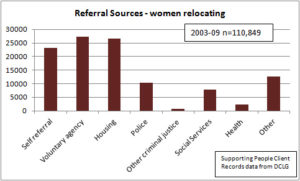Women who have to relocate to escape domestic violence often lose personal possessions, furniture, employment, and contact with friends or family who might be at risk from an abusive partner trying to track them down. They may lose the chance of study or specialist services that they had applied for in one locality, and now have to start again at the bottom of a waiting list. Many also lose their housing rights when they have to give up a secure tenancy and are unable to afford, or are ineligible for, similar housing security in their new location. In so many ways, the emotional and practical implications of the abuse and the relocation are highly disruptive for women and their children.
However, in London at least, there is now the chance of less of a loss on the journey.
The Pan-London Housing Reciprocal was launched in January and enables people with a social housing tenancy, and who relocate due to a high risk of harm, to move elsewhere in London and retain their security of tenure. They can move somewhere where they will be safe, and not have to choose between security of themselves and security of their housing rights. The majority of London Boroughs (27) and 17 Registered Housing Providers have signed up to the scheme so far, so for some people there should be less of a loss on the domestic violence journey.
For details of how to refer: http://saferlondon.org.uk/pan-london-housing-reciprocal/

